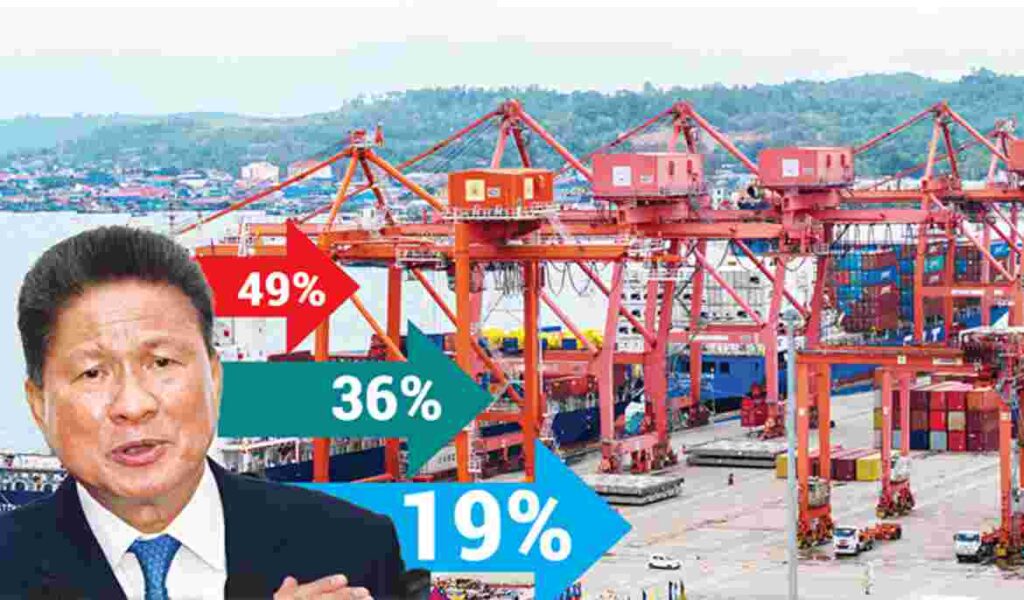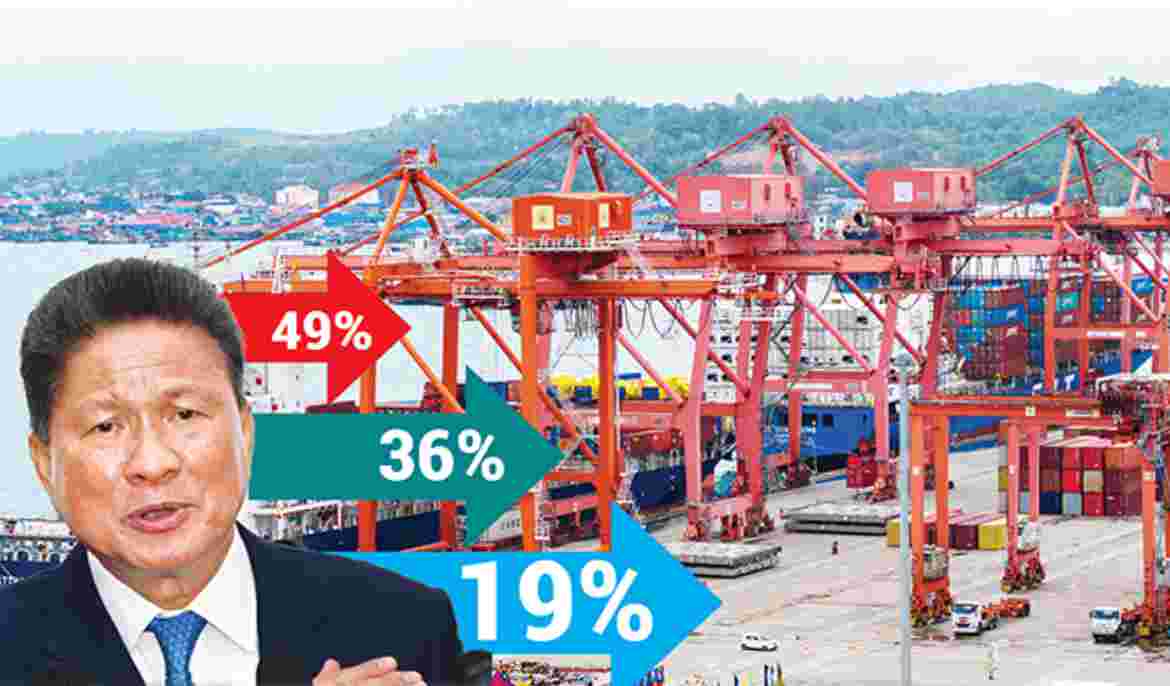Synopsis: The new 19 percent import duty allows Cambodian products to compete fairly with regional countries, and attract more foreign direct investment, helping the Kingdom advance its economic growth ambitions, says Sun Chanthol, Deputy Prime Minister.
With the new 19 percent import duty on Cambodian products entering the US market, the Royal Government expects to attract over 500 investment projects, potentially generating over 300,000 jobs annually, urging all migrant workers to return home and contribute to national economic development.
Addressing a press meet on Friday, Sun Chanthol, Deputy Prime Minister and First Vice-Chairman of the Council for the Development of Cambodia (CDC), welcomed the US President Donald Trump’s last-minute decision to reduce the reciprocal tariff rate from 49 to 19 percent, a reduction of 30 percent.
Chanthol said, “The new 19 percent import duty allows Cambodian products to compete fairly with regional countries. It is also expected to attract more foreign direct investment (FDI), helping the Kingdom advance its economic growth ambitions.”
“I believe that the CDC will register over 500 investment projects this year. I wouldn’t say 600 projects, but with this new tariff rate, we have a very high confidence,” he claimed.
The Deputy Prime Minister emphasised that with these investments, Cambodia could generate over 300,000 new jobs annually, creating economic opportunities and improving livelihoods for local communities nationwide.
Chanthol called on Cambodian migrant workers to return home and assured them that sufficient job opportunities are now available, underscoring that their return would inject fresh energy into the domestic economy and advance national development goals.
“All brothers and sisters working overseas, please return to our country – our home, language, food, family, religion, king and government. You should consider coming back to the homeland and helping boost national economic growth,” he said.
https://googleads.g.doubleclick.net/pagead/ads?client=ca-pub-7981514788931893&output=html&h=280&slotname=4059842397&adk=3529343492&adf=4010010295&pi=t.ma~as.4059842397&w=750&abgtt=6&fwrn=4&fwrnh=100&lmt=1754292883&rafmt=1&format=750×280&url=https%3A%2F%2Fwww.khmertimeskh.com%2F501731690%2Fkingdom-eyes-investments-jobs-surge-post-tariff-reduction%2F&fwr=0&rpe=1&resp_fmts=3&wgl=1&uach=WyJXaW5kb3dzIiwiMTkuMC4wIiwieDg2IiwiIiwiMTM4LjAuMzM1MS4xMjEiLG51bGwsMCxudWxsLCI2NCIsW1siTm90KUE7QnJhbmQiLCI4LjAuMC4wIl0sWyJDaHJvbWl1bSIsIjEzOC4wLjcyMDQuMTg0Il0sWyJNaWNyb3NvZnQgRWRnZSIsIjEzOC4wLjMzNTEuMTIxIl1dLDBd&dt=1754292882862&bpp=3&bdt=381&idt=89&shv=r20250730&mjsv=m202507290101&ptt=9&saldr=aa&abxe=1&cookie=ID%3D67e34bb3c3602a99%3AT%3D1748239820%3ART%3D1754292732%3AS%3DALNI_MZ9WnYJRvq0wQnr0ABvgb3yZ2dV8A&gpic=UID%3D000010e82a43ea78%3AT%3D1748239820%3ART%3D1754292732%3AS%3DALNI_Mb_jT4JgIj9bmfHlQDXDXo08Q6xUw&eo_id_str=ID%3D8acbd9ed3bbf4ae5%3AT%3D1748239820%3ART%3D1754292732%3AS%3DAA-AfjajqdsfBH648tM7O872ou0M&prev_fmts=0x0&nras=1&correlator=3719891578466&frm=20&pv=1&u_tz=420&u_his=1&u_h=1080&u_w=1920&u_ah=1032&u_aw=1920&u_cd=24&u_sd=0.8&dmc=8&adx=616&ady=2072&biw=2371&bih=1192&scr_x=0&scr_y=0&eid=95362655%2C95366794%2C95366915%2C31093740%2C95366854%2C95359265%2C95367171%2C31092546&oid=2&pvsid=5748818895923367&tmod=1208160398&uas=0&nvt=1&ref=https%3A%2F%2Fwww.linkedin.com%2F&fc=1920&brdim=1537%2C1%2C1537%2C1%2C1920%2C0%2C1918%2C1030%2C2390%2C1192&vis=1&rsz=%7C%7CEebr%7C&abl=CS&pfx=0&fu=128&bc=31&bz=0.8&td=1&tdf=2&psd=W251bGwsbnVsbCxudWxsLDNd&nt=1&pgls=CAEQARoFNC44LjU.~CAEaBTYuOC4y~CAA.&ifi=2&uci=a!2&btvi=1&fsb=1&dtd=96
https://googleads.g.doubleclick.net/pagead/ads?client=ca-pub-7981514788931893&output=html&h=280&slotname=4059842397&adk=3049278426&adf=588353375&pi=t.ma~as.4059842397&w=750&abgtt=6&fwrn=4&fwrnh=100&lmt=1754292883&rafmt=1&format=750×280&url=https%3A%2F%2Fwww.khmertimeskh.com%2F501731690%2Fkingdom-eyes-investments-jobs-surge-post-tariff-reduction%2F&fwr=0&rpe=1&resp_fmts=3&wgl=1&uach=WyJXaW5kb3dzIiwiMTkuMC4wIiwieDg2IiwiIiwiMTM4LjAuMzM1MS4xMjEiLG51bGwsMCxudWxsLCI2NCIsW1siTm90KUE7QnJhbmQiLCI4LjAuMC4wIl0sWyJDaHJvbWl1bSIsIjEzOC4wLjcyMDQuMTg0Il0sWyJNaWNyb3NvZnQgRWRnZSIsIjEzOC4wLjMzNTEuMTIxIl1dLDBd&dt=1754292882865&bpp=1&bdt=384&idt=110&shv=r20250730&mjsv=m202507290101&ptt=9&saldr=aa&abxe=1&cookie=ID%3D67e34bb3c3602a99%3AT%3D1748239820%3ART%3D1754292732%3AS%3DALNI_MZ9WnYJRvq0wQnr0ABvgb3yZ2dV8A&gpic=UID%3D000010e82a43ea78%3AT%3D1748239820%3ART%3D1754292732%3AS%3DALNI_Mb_jT4JgIj9bmfHlQDXDXo08Q6xUw&eo_id_str=ID%3D8acbd9ed3bbf4ae5%3AT%3D1748239820%3ART%3D1754292732%3AS%3DAA-AfjajqdsfBH648tM7O872ou0M&prev_fmts=0x0%2C750x280&nras=1&correlator=3719891578466&frm=20&pv=1&u_tz=420&u_his=1&u_h=1080&u_w=1920&u_ah=1032&u_aw=1920&u_cd=24&u_sd=0.8&dmc=8&adx=616&ady=2352&biw=2371&bih=1192&scr_x=0&scr_y=0&eid=95362655%2C95366794%2C95366915%2C31093740%2C95366854%2C95359265%2C95367171%2C31092546&oid=2&pvsid=5748818895923367&tmod=1208160398&uas=0&nvt=1&ref=https%3A%2F%2Fwww.linkedin.com%2F&fc=1920&brdim=1537%2C1%2C1537%2C1%2C1920%2C0%2C1918%2C1030%2C2390%2C1192&vis=1&rsz=%7C%7CEebr%7C&abl=CS&pfx=0&fu=128&bc=31&bz=0.8&td=1&tdf=2&psd=W251bGwsbnVsbCxudWxsLDNd&nt=1&pgls=CAEQARoFNC44LjU.~CAEaBTYuOC4y~CAA.&ifi=3&uci=a!3&btvi=2&fsb=1&dtd=116
He stressed that working abroad offers limited benefit to Cambodia’s economy, while domestic employment plays a vital role in driving growth, reducing poverty and strengthening the Kingdom’s long-term development trajectory.
Responding to a query by Khmer Times, Chanthol confirmed that the favourable tariff rate followed a phone conversation between Prime Minister Hun Manet and President Donald Trump last week: “The Premier informed President Trump that Cambodia is a country that has suffered from conflicts and wars over the past 500 years, and we only achieved full peace in 1998.”
“Therefore, we need a low tariff rate so that Cambodia can attract more investors, which is a crucial opportunity to create jobs and reduce poverty.”
He emphasised that President Trump sympathised with Cambodia and understood clearly that it is a small, poor and historically victimised country. “That is why he lowered the tariff rate to 19 percent, a level that allows us to compete with other countries in the region,” Chanthol added.
Later in the day, Mr Hun Manet wrote on his social media that the US has officially reduced tariffs on Cambodian exports to 19 percent, down from the original 49 percent.
https://googleads.g.doubleclick.net/pagead/ads?client=ca-pub-7981514788931893&output=html&h=280&slotname=4059842397&adk=3000604593&adf=3322151211&pi=t.ma~as.4059842397&w=750&abgtt=6&fwrn=4&fwrnh=100&lmt=1754292883&rafmt=1&format=750×280&url=https%3A%2F%2Fwww.khmertimeskh.com%2F501731690%2Fkingdom-eyes-investments-jobs-surge-post-tariff-reduction%2F&fwr=0&rpe=1&resp_fmts=3&wgl=1&uach=WyJXaW5kb3dzIiwiMTkuMC4wIiwieDg2IiwiIiwiMTM4LjAuMzM1MS4xMjEiLG51bGwsMCxudWxsLCI2NCIsW1siTm90KUE7QnJhbmQiLCI4LjAuMC4wIl0sWyJDaHJvbWl1bSIsIjEzOC4wLjcyMDQuMTg0Il0sWyJNaWNyb3NvZnQgRWRnZSIsIjEzOC4wLjMzNTEuMTIxIl1dLDBd&dt=1754292882866&bpp=1&bdt=385&idt=120&shv=r20250730&mjsv=m202507290101&ptt=9&saldr=aa&abxe=1&cookie=ID%3D67e34bb3c3602a99%3AT%3D1748239820%3ART%3D1754292732%3AS%3DALNI_MZ9WnYJRvq0wQnr0ABvgb3yZ2dV8A&gpic=UID%3D000010e82a43ea78%3AT%3D1748239820%3ART%3D1754292732%3AS%3DALNI_Mb_jT4JgIj9bmfHlQDXDXo08Q6xUw&eo_id_str=ID%3D8acbd9ed3bbf4ae5%3AT%3D1748239820%3ART%3D1754292732%3AS%3DAA-AfjajqdsfBH648tM7O872ou0M&prev_fmts=0x0%2C750x280%2C750x280&nras=1&correlator=3719891578466&frm=20&pv=1&u_tz=420&u_his=1&u_h=1080&u_w=1920&u_ah=1032&u_aw=1920&u_cd=24&u_sd=0.8&dmc=8&adx=616&ady=3225&biw=2371&bih=1192&scr_x=0&scr_y=0&eid=95362655%2C95366794%2C95366915%2C31093740%2C95366854%2C95359265%2C95367171%2C31092546&oid=2&pvsid=5748818895923367&tmod=1208160398&uas=0&nvt=1&ref=https%3A%2F%2Fwww.linkedin.com%2F&fc=1920&brdim=1537%2C1%2C1537%2C1%2C1920%2C0%2C1918%2C1030%2C2390%2C1192&vis=1&rsz=%7C%7CEebr%7C&abl=CS&pfx=0&fu=128&bc=31&bz=0.8&td=1&tdf=2&psd=W251bGwsbnVsbCxudWxsLDNd&nt=1&pgls=CAEQARoFNC44LjU.~CAEaBTYuOC4y~CAA.&ifi=4&uci=a!4&btvi=3&fsb=1&dtd=125
https://googleads.g.doubleclick.net/pagead/ads?client=ca-pub-7981514788931893&output=html&h=280&slotname=4059842397&adk=3775049359&adf=4268136288&pi=t.ma~as.4059842397&w=750&abgtt=6&fwrn=4&fwrnh=100&lmt=1754292883&rafmt=1&format=750×280&url=https%3A%2F%2Fwww.khmertimeskh.com%2F501731690%2Fkingdom-eyes-investments-jobs-surge-post-tariff-reduction%2F&fwr=0&rpe=1&resp_fmts=3&wgl=1&uach=WyJXaW5kb3dzIiwiMTkuMC4wIiwieDg2IiwiIiwiMTM4LjAuMzM1MS4xMjEiLG51bGwsMCxudWxsLCI2NCIsW1siTm90KUE7QnJhbmQiLCI4LjAuMC4wIl0sWyJDaHJvbWl1bSIsIjEzOC4wLjcyMDQuMTg0Il0sWyJNaWNyb3NvZnQgRWRnZSIsIjEzOC4wLjMzNTEuMTIxIl1dLDBd&dt=1754292882867&bpp=1&bdt=386&idt=129&shv=r20250730&mjsv=m202507290101&ptt=9&saldr=aa&abxe=1&cookie=ID%3D67e34bb3c3602a99%3AT%3D1748239820%3ART%3D1754292732%3AS%3DALNI_MZ9WnYJRvq0wQnr0ABvgb3yZ2dV8A&gpic=UID%3D000010e82a43ea78%3AT%3D1748239820%3ART%3D1754292732%3AS%3DALNI_Mb_jT4JgIj9bmfHlQDXDXo08Q6xUw&eo_id_str=ID%3D8acbd9ed3bbf4ae5%3AT%3D1748239820%3ART%3D1754292732%3AS%3DAA-AfjajqdsfBH648tM7O872ou0M&prev_fmts=0x0%2C750x280%2C750x280%2C750x280&nras=1&correlator=3719891578466&frm=20&pv=1&u_tz=420&u_his=1&u_h=1080&u_w=1920&u_ah=1032&u_aw=1920&u_cd=24&u_sd=0.8&dmc=8&adx=616&ady=3505&biw=2371&bih=1192&scr_x=0&scr_y=0&eid=95362655%2C95366794%2C95366915%2C31093740%2C95366854%2C95359265%2C95367171%2C31092546&oid=2&pvsid=5748818895923367&tmod=1208160398&uas=0&nvt=1&ref=https%3A%2F%2Fwww.linkedin.com%2F&fc=1920&brdim=1537%2C1%2C1537%2C1%2C1920%2C0%2C1918%2C1030%2C2390%2C1192&vis=1&rsz=%7C%7CEebr%7C&abl=CS&pfx=0&fu=128&bc=31&bz=0.8&td=1&tdf=2&psd=W251bGwsbnVsbCxudWxsLDNd&nt=1&pgls=CAEQARoFNC44LjU.~CAEaBTYuOC4y~CAA.&ifi=5&uci=a!5&btvi=4&fsb=1&dtd=134
The Premier called it ‘great news for the people and the economy of Cambodia’, adding that the move will help the Kingdom to continue developing the national economy.
The decision followed his phone calls with President Trump on July 26 and 28, during which he requested tariff relief to improve the living standards of the Cambodian people.
Mr Hun Manet also praised President Trump’s deep personal sympathy for Cambodia and commended Chanthol and the negotiating team for their efforts in achieving this outcome.
Speaking to Khmer Times, Arnaud Darc, Chairman & CEO of Thalias and Co-Chair of the Government-Private Sector Forum (Working Group D), said that the White House issued Executive Order 14257, detailing the final reciprocal tariff structure for Southeast Asia.
He noted, “The headline for Cambodia: the feared 49 percent punitive tariff has been replaced by a 19 percent rate, effective August 7.”
“While this reprieve avoids the economic devastation of a near-total export shutdown, it still imposes significant cost pressures, and signals a new era of uncertainty for Cambodia’s export-led growth model.”
He explained that at 19 percent, Cambodia now aligns with Indonesia, Malaysia, the Philippines and Thailand. But when combined with existing Most Favoured Nation (MFN) duties under the US Harmonized Tariff Schedule (typically 16-20 percent for garments and footwear), the effective border cost rises to 35-39 percent per item, sharply undermining Cambodia’s price competitiveness.
Arnaud went on to add that this revision averts catastrophe but doesn’t restore parity. “Countries with duty-free access like Kenya under the African Growth and Opuntias Act (AGOA) or Honduras under Central America Free Trade Agreement-Dominican Republic (CAFTA-DR) now enjoy a 30-40 percentage point cost advantage.
He emphasised that Cambodia, which previously relied on ethical sourcing and cost efficiency to differentiate itself, must now compete in a landscape where tariff alignment, logistics capacity, and productivity levels become decisive.
“Importantly, the Executive Order includes no sunset clause or automatic review. The 19 percent rate is indefinite unless modified through future bilateral negotiation,” he added.
Lor Vichet, Vice President of the Cambodia-Chinese Commerce Association (CCCA), told Khmer Times that while the US remains Cambodia’s largest export market – accounting for approximately 40 percent of total exports – the country’s export competitiveness cannot rely solely on favourable US tariffs. “Expanding Cambodian products to other export destinations is also a priority,” he said.
He welcomed the recent tariff reduction, which brings Cambodia closer to regional competitors such as Thailand, Malaysia, and Vietnam. However, Vichet stressed that expectations for a rise in factory investments and increased production capacity will depend on broader structural reforms beyond trade preferences alone.
He explained that one of the most pressing issues is reducing the overall cost of electricity for industrial operations. Many manufacturing activities, particularly in heavy industry, require substantial amounts of stable electricity for operations.
“While the cost for household users remains fair and does not need adjustment, industrial manufacturing requires more competitive pricing to remain viable.”
Vichet urged the Royal Government to promote the development of renewable energy projects, which could deliver more stable and lower-cost electricity to support industrial growth.
In addition to energy costs, the CCCA Vice-President emphasised the need to streamline customs procedures and simplify business registration.
“Lengthy documentation processes, unclear approval timelines add unnecessary costs and time constraints for investors, making Cambodia less attractive compared to its regional peers.
Reducing bureaucracy and the time needed for procedures and processes to be approved would ease business operations and encourage foreign investment.”
Vichet also called on the government to double its efforts to improve Cambodia’s ranking in the ease of doing business index. “Doing so would boost investor confidence, promote diversification of foreign investment and strengthen economic resilience.”
Over the long term, Cambodia must move beyond labour-intensive exports and begin focusing on skill-intensive manufacturing and value-added services. This transition is essential to fully leverage the benefits of the revised US tariff agreement and ensure sustainable growth in the export sector, the CCCA Vice-President added.



